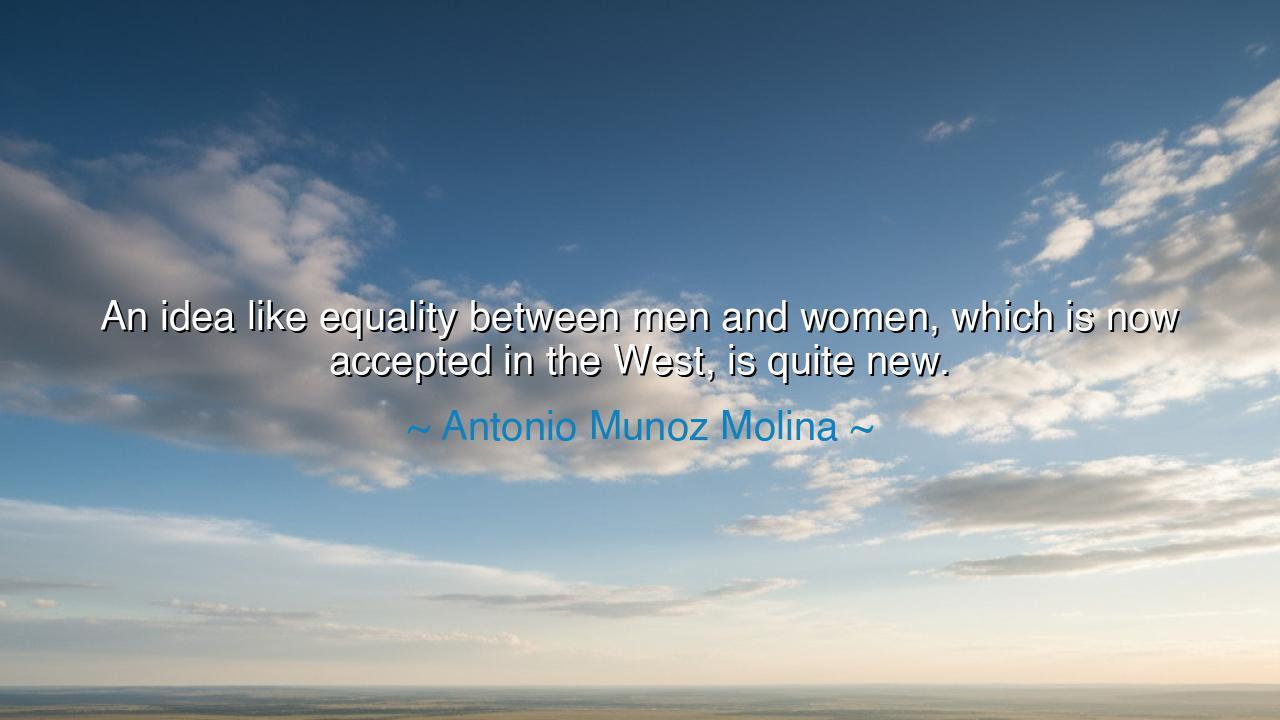
An idea like equality between men and women, which is now
An idea like equality between men and women, which is now accepted in the West, is quite new.






In the reflective and penetrating words of Antonio Muñoz Molina, the Spanish novelist and philosopher, there is a reminder both humbling and profound: “An idea like equality between men and women, which is now accepted in the West, is quite new.” These words, though simple in form, carry the weight of centuries of human struggle. They are not spoken as reproach, but as remembrance—a call for humility before history. For what we call progress today is but the fruit of countless generations who lived and died before the seed of equality could even take root. Molina’s statement reminds us that what we now take as truth was once unthinkable, that the ideals we hold sacred were once whispered in fear or dismissed in scorn.
The meaning of this quote lies in its revelation that equality between men and women is not an ancient assumption but a recent awakening. For thousands of years, humanity walked under the shadow of imbalance—when the voice of woman was silenced, her power confined, her destiny dictated not by her will, but by the customs of men. The ancient world, magnificent in art and empire, was blind in this one regard. Greece, which gave us philosophy, denied women the right to study it; Rome, which built laws, did not see fit to make women equal beneath them. Even within the great faiths and kingdoms of the past, the idea that woman and man stood as equals before the divine and before society was a notion barely conceived, and rarely spoken aloud.
The origin of this transformation can be traced not to the swords of conquerors or the decrees of kings, but to the slow, courageous labor of the unseen—the thinkers, writers, and rebels who dared to question the eternal order. In the Age of Enlightenment, a few voices, small yet bright, began to speak. Among them was Mary Wollstonecraft, who in 1792 wrote A Vindication of the Rights of Woman. She argued that women were not inferior by nature but diminished by ignorance and denial of education. Her ideas, ridiculed in her time, became the dawn that would one day become the daylight of equality. Molina’s reflection honors such beginnings—the moments when a radical thought, scorned by its age, becomes the cornerstone of the next.
History is filled with examples of how long it took for this “new idea” to be accepted. Even after revolutions claimed liberty for all, women were not included in the “all.” When America declared that “all men are created equal,” it meant only men. When the French Revolution cried for fraternity, it forgot its sisters. The world was slow to awaken, but awaken it did. Across the 19th and 20th centuries, women rose—not with armies, but with words and will. The suffragettes marched in the streets, endured imprisonment, hunger, and mockery. In the factories of war, women proved their strength; in the halls of education, their intellect; and in the courts of justice, their right to stand equal. What Molina reminds us is that this awakening is new, that within the timeline of civilization, the age of equality is but a flicker—a light still young and fragile, needing protection from the winds of complacency.
There is deep wisdom in recognizing how new this progress truly is. For when we forget how recently these changes came, we risk assuming they are eternal and secure. We forget the long centuries when women’s lives were bartered like coin, when their genius was hidden behind walls, when their worth was measured by obedience. By calling the idea “new,” Molina urges us to guard it carefully, for what is new can still be lost. History has shown that freedom, once won, can be forgotten; that equality, once achieved, can erode if not cherished. The soil of progress must be tended by remembrance, lest it grow barren again.
Consider, too, that in many corners of the world today, this idea remains contested. While the West may have embraced the principle, elsewhere the struggle continues. The story of Malala Yousafzai, who was shot for seeking education, reminds us that equality is not merely a Western treasure but a universal right still fought for in darkness. Molina’s quote, therefore, is both recognition and warning—a call to honor the work done, and to complete the work unfinished.
Therefore, O listener, take this lesson into your heart: never take progress for granted. Every right, every freedom, every equality you possess was purchased by those who came before you with courage and sacrifice. Do not let comfort dull the edge of conscience. Speak for equality not as a gift of the modern world, but as a living duty—to keep its flame alive, to spread its light where shadows remain. Let gratitude become vigilance, and remembrance become resolve.
And so, remember the enduring wisdom of Antonio Muñoz Molina: that the idea of equality is young, and like all young things, it must be nurtured. It is a child born of centuries of silence, raised by courage, and protected by truth. If we honor its youth with care and courage, then one day it shall grow old—not as a fragile dream, but as a lasting truth woven into the very heart of humankind.






AAdministratorAdministrator
Welcome, honored guests. Please leave a comment, we will respond soon